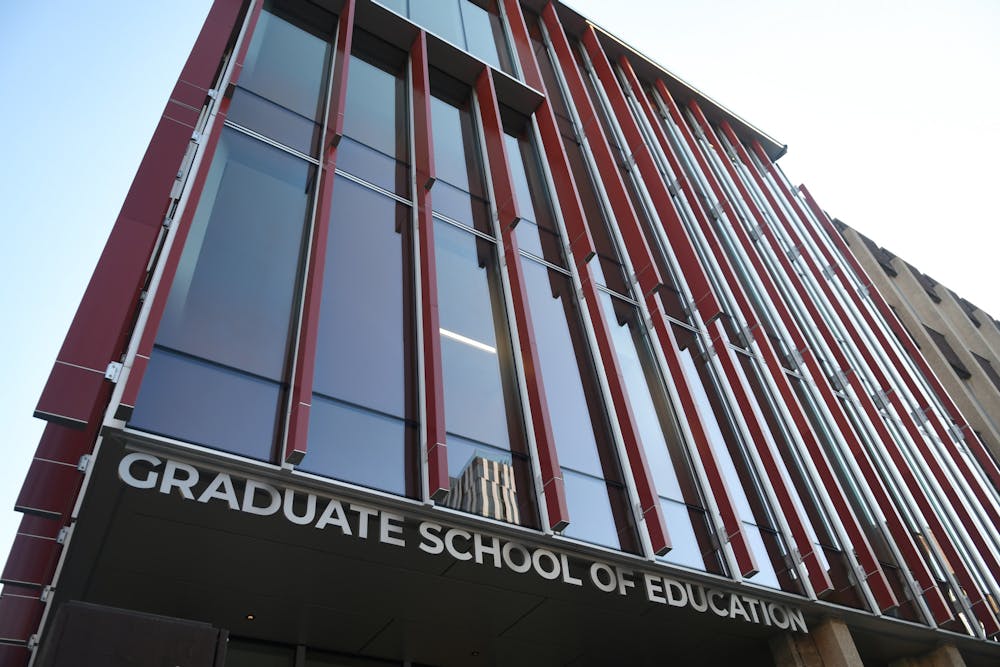Top Penn Medicine administrators and the dean of the Graduate School of Education denounced calls for genocide as a form of hate following unprecedented levels of scrutiny after Penn President Liz Magill's congressional hearing.
Dean of the Perelman School of Medicine and Executive Vice President of the University of Pennsylvania Health System J. Larry Jameson and Chief Executive Officer of UPHS Kevin Mahoney condemned hateful actions in a letter sent to the Penn Med community on Dec. 7, which was obtained by The Daily Pennsylvanian. GSE Dean Katharine Strunk sent a separate letter obtained by the DP to GSE students, faculty, and staff on Dec. 8.
Neither letter explicitly mentioned Magill or the congressional hearing. Both statements condemned antisemitism and other forms of hate, including Islamophobia.
A Penn Med spokesperson verified that the letter was sent at 4 p.m. on Dec. 7.
"Calls for genocide, echoing horrors of the past, violate our behavioral standards and remind us that we must forcefully condemn, prevent, and respond to hate in all forms," the Penn Med letter said.
The Penn Med letter — called "A Message on Penn Medicine’s Ongoing Response to Antisemitism and Other Forms of Hate" — acknowledged "heightened emotions" of recent months and aimed to clarify Penn Med's position.
"Like you, we are alarmed and devastated each time we hear about an incident of antisemitism, Islamophobia, or hate in any form," the letter said. "The fear and traumatic effects are acute but can also be long-lasting."
The letter said that Penn Med will not tolerate antisemitism or other forms of hate, adding that the leadership has heard inquiries about how Penn Med is working "to ensure safety and provide patient care that is free of bias.
RELATED:
Penn community members call for Magill's resignation at campus rally following House testimony
Magill apology videos fails to stop uproar from Penn community members, politicians
The GSE letter also condemned calls for genocide, adding that GSE does not tolerate intimidation, bias, and harassment.
"We are all watching the national headlines and news reports about Penn and antisemitism with anguish and confusion," the GSE letter wrote. "This shouldn’t need saying, but nonetheless, I feel compelled to make Penn GSE’s position clear — antisemitism, Islamophobia, and other forms of hate have no place in our school."
The GSE letter was forwarded to GSE alumni, adding that GSE is committed to the safety of its community members.
"I know that seeing recent events play out so publicly, and in ways that feel threatening to the safety of the Penn community, is disappointing, traumatic, and deeply saddening," the GSE letter to alumni said.
The letters come amid mounting scrutiny of Magill's response to a question from Rep. Elise Stefanik (R-N.Y.), who asked whether individuals who call for the genocide of Jewish people violate Penn’s policies or code of conduct. Stefanik described calls for "Intifada revolution" among some protesters on campus as calls for genocide of Jewish people.
“If the speech turns into conduct, it can be harassment,” Magill told Stefanik at the House Committee on Education and the Workforce hearing, later adding, “It is a context-dependent decision."
This response prompted Stefanik to continue probing.
“This is the easiest question to answer. 'Yes,' Ms. Magill,” Stefanik said. “Conduct meaning committing the act of genocide? … This is unacceptable, Ms. Magill.”
Magill ultimately reiterated that calling for the genocide of Jewish people "can be harassment."
The University's "Free Speech FAQs" detail Penn's guidelines governing hate speech. These rules state that speech can only be disciplined by the University if "the inflammatory speech intentionally and effectively provokes a crowd to immediately carry out violent and unlawful action."
Magill expressed regret for her statements in a video released Wednesday evening, pledging to evaluate Penn's policies regarding hate on campus. Numerous donors, alumni, and politicians have since called for her resignation.
Senior reporters Ben Binday and Nitin Seshadri and staff reporters Diamy Wang and Emily Scolnick contributed reporting.









